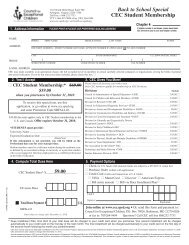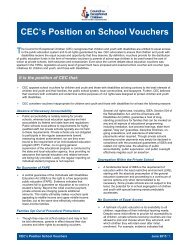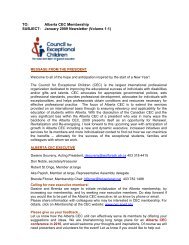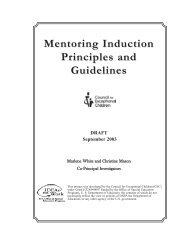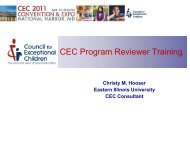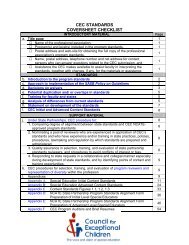What Every Must Know Special Educator - Council for Exceptional ...
What Every Must Know Special Educator - Council for Exceptional ...
What Every Must Know Special Educator - Council for Exceptional ...
You also want an ePaper? Increase the reach of your titles
YUMPU automatically turns print PDFs into web optimized ePapers that Google loves.
Section 6: Paraeducators Serving Individuals With<br />
<strong>Exceptional</strong> Learning Needs<br />
This section provides in<strong>for</strong>mation about the increasingly<br />
critical role of paraeducators in special education<br />
service delivery, the CEC standards <strong>for</strong> paraeducator<br />
preparation, and tools paraeducators and paraeducator<br />
training programs can use to ensure that they are<br />
meeting the standards.<br />
For more than 50 years, paraeducators have helped<br />
special educators provide important services to<br />
individuals with exceptional learning conditions.<br />
Historically, they provided services ranging from clerical<br />
tasks to assisting with individualized functional<br />
living tasks. Today they have become an essential part<br />
of the special education team in delivering individualized<br />
services and playing an increasingly prominent<br />
role in the instruction of individuals with exceptional<br />
learning needs at all ages. According to the Study<br />
of Personnel Needs in <strong>Special</strong> Education (SPENSE,<br />
2003.), today paraeducators in the United States spend<br />
at least 10% of their time on the following activities:<br />
• Providing instructional support in small<br />
groups<br />
• Providing one-to-one instruction<br />
• Modifying materials<br />
• Implementing behavior plans<br />
• Monitoring hallways, study halls<br />
• Meeting with teachers<br />
• Collecting data on individuals with<br />
exceptional learning needs<br />
• Providing personal care assistance<br />
The qualified special education paraeducator per<strong>for</strong>ms<br />
tasks prescribed and supervised by a fully licensed<br />
special education professional. Qualified paraeducators<br />
deliver individualized services to individuals<br />
with exceptional learning needs in a wide variety of<br />
settings, including general education classes, community-based<br />
functional learning sites, and just about<br />
everywhere that a special education professional can<br />
be found. Paraeducators bring a wide variety of backgrounds<br />
and experience to their jobs (SPENSE, 2003).<br />
In the United States, 29% have high school diplomas,<br />
38% have completed some college, and 32% hold an<br />
associate’s degree or higher. Paraeducators with college<br />
experience have increased confidence in collaborating<br />
and communicating with teachers. The majority<br />
of paraeducators are supervised by special education<br />
teachers and overwhelmingly they feel supported by<br />
their special education supervisors.<br />
To ensure that paraeducators have the required skills<br />
<strong>for</strong> their expanded roles, in collaboration with the<br />
National Resource Center <strong>for</strong> Paraeducators, CEC<br />
validated the following knowledge and skill set <strong>for</strong><br />
paraeducators who serve individuals with exceptional<br />
learning needs. In addition, CEC has validated a set<br />
of corollary knowledge and skills <strong>for</strong> paraeducators<br />
of individuals with deaf-blindness (i.e., paraeducator<br />
interveners <strong>for</strong> individuals with deaf-blindness). CEC<br />
expects that agencies will ensure that all paraeducators<br />
working with individuals with exceptional learning<br />
needs have, at a minimum, mastered the Paraeducator<br />
Common Core and appropriate specialization<br />
knowledge and skills through ongoing, effective,<br />
preservice and continuing education with professional<br />
educators and training that is specifically targeted <strong>for</strong><br />
paraeducators.<br />
Paraeducators should have available ongoing,<br />
effective, continuing training with professional<br />
educators and training that is specifically targeted <strong>for</strong><br />
paraeducators.<br />
Section 6: ParaeducatorS Serving individualS with excePtional learning needS 189



